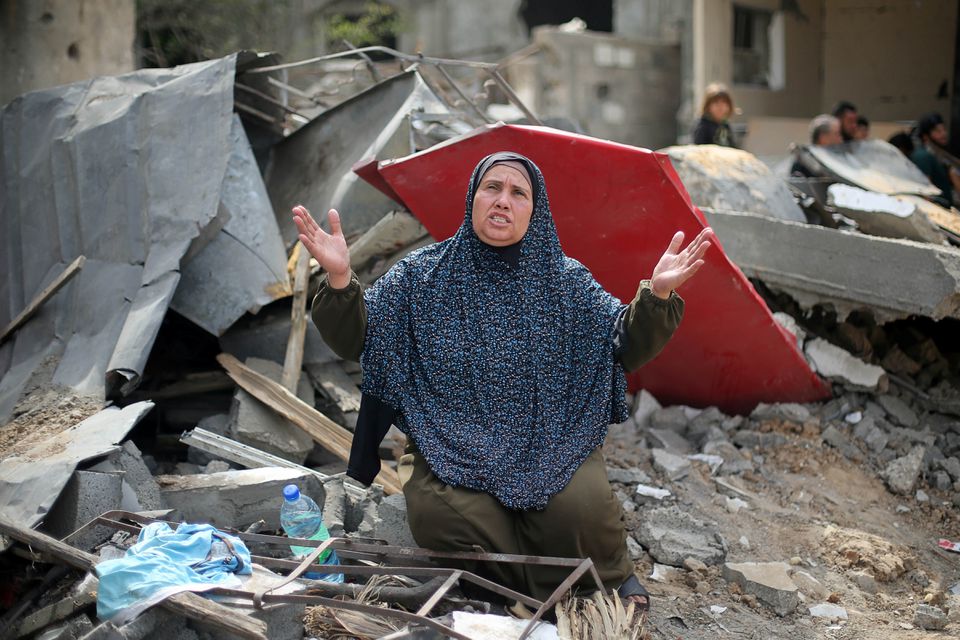(Reuters): A truce between Israel and Hamas took hold on Friday after the worst violence in years, with U.S. President Joe Biden pledging to salvage the devastated Gaza Strip and the United Nations urging renewed Israeli-Palestinian dialogue.
Israel’s bombardment of Gaza and militant rocket attacks on Israeli towns ceased after 11 days under an agreement mediated by Egypt, but with negotiations to maintain stability still to be held, it was unclear how long it would last.
Five more bodies were pulled from the rubble in the densely populated Palestinian enclave,taking the death toll to 243, including 66 children, with more than 1,900 wounded and critical infrastructure damaged as well as thousands of homes.
In Israel, the military said a soldier had been killed as well as 12 civilians; hundreds have been treated for injuries in rocket salvoes that caused panic and sent people rushing into shelters as far away as Tel Aviv.
Palestinians who had huddled in fear of Israeli shelling poured into Gaza’s streets, embracing one another in celebration in front of bombed-out buildings.
Mosque loudspeakers feted “the victory of the resistance achieved over the Occupation (Israel).” read more Cars driving around East Jerusalem’s Sheikh Jarrah at dawn flew Palestinian flags and honked horns, echoing the scenes in Gaza.
In the countdown to the 2 a.m. (2300 GMT Thursday) cease-fire, Palestinian rocket salvoes continued and Israel carried out at least one air strike.
Egypt said it would send two delegations to monitor it as the warring parties said they were ready to retaliate for any violations.
Civilians on both sides of the front line were sceptical.
“I don’t agree to (truce). What is truce? What does it mean?” said Samira Abdallah Naseer, a mother of 11 children sitting near the wreckage of a building near Beit Hanoun in the north of the Gaza Strip.
“We returned to our houses, and we found no place to sit, no water, no electricity, no mattresses, nothing,” she said.
In a cafe in the Israeli port city of Ashdod, north of Gaza, student Dan Kiri, 25, said Israel should continue targeting Hamas until it collapsed.
“The fact that we are sitting here, peacefully drinking coffee and eating our croissant, it’s only a matter of time until the next operation in Gaza,” he said.
The violence erupted on May 10, triggered by Palestinians’ anger at what they saw as Israeli curbs on their rights in Jerusalem, including during police confrontations with protesters at Al-Aqsa mosque during the Ramadan fasting month.
RECONSTRUCTION
Israeli Prime Minister Benjamin Netanyahu said the operation had hit the ability of Hamas, the Islamist group which runs Gaza, to launch missiles at Israel.
Netanyahu said the Israeli military had attacked and destroyed Hamas’s extensive tunnel network in Gaza, its rocket factories, weapons laboratories and storage facilities and killed more than 200 militants, including 25 senior operatives.
“Hamas can’t hide anymore. That’s a great achievement for Israel,” he said in a televised address. “We eliminated an important part of Hamas’s and Islamic Jihad’s command echelon. And whoever was not killed, knows today that our long arm can reach him anywhere, above ground or underground.”
Hamas however cast the fighting as successful resistance to a militarily and economically stronger foe.
“It is true the battle ends today but Netanyahu and the whole world should know that our hands are on the trigger and we will continue to grow the capabilities of this resistance,” said Ezzat El-Reshiq, a senior member of the Hamas political bureau.
El-Reshiq told Reuters in Doha the movement’s demands included protecting the Al-Aqsa mosque in Jerusalem and stopping Palestinians being evicted from their homes in East Jerusalem.
Saleh Diab, who was among those threatened with eviction, was relieved but wary. “This is a morning of freedom, a morning of victory,” he said, adding that hoped now to remain in his home but feared what Israel would do next.
Amid growing global alarm, Biden had urged Netanyahu to seek de-escalation, while Egypt, Qatar and the United Nations sought to mediate. The truce appeared to be part of a two-stage deal.
“Cairo will send two security delegations to Tel Aviv and the Palestinian territories to follow up on the implementation measures and to agree on later measures which aim to maintain the stability of the situation permanently,” an Egyptian government statement said.
In a televised address on Thursday, Biden extended condolences to bereaved Israelis and Palestinians and said Washington would work with the United Nations “and other international stakeholders to provide rapid humanitarian assistance” for Gaza and its reconstruction.
After days of Israeli air strikes that destroyed residential towers and damaged electricity lines, Gaza officials said 16,800 homes were damaged and residents were getting three or four hours of power compared with 12 hours before the fighting.
Palestinian officials put the cost of Gaza reconstruction in the tens of millions of dollars, while economists said the fighting could curb Israel’s economic recovery from the COVID-19 pandemic.
Biden said aid to Gaza would be coordinated with the Palestinian Authority – run by Hamas’ rival, President Mahmoud Abbas, backed by the West and based in the Israeli-occupied West Bank – “in a manner that does not permit Hamas to simply restock its military arsenal”.
Hamas is deemed a terrorist group in the West and by Israel, which it refuses to recognize.
